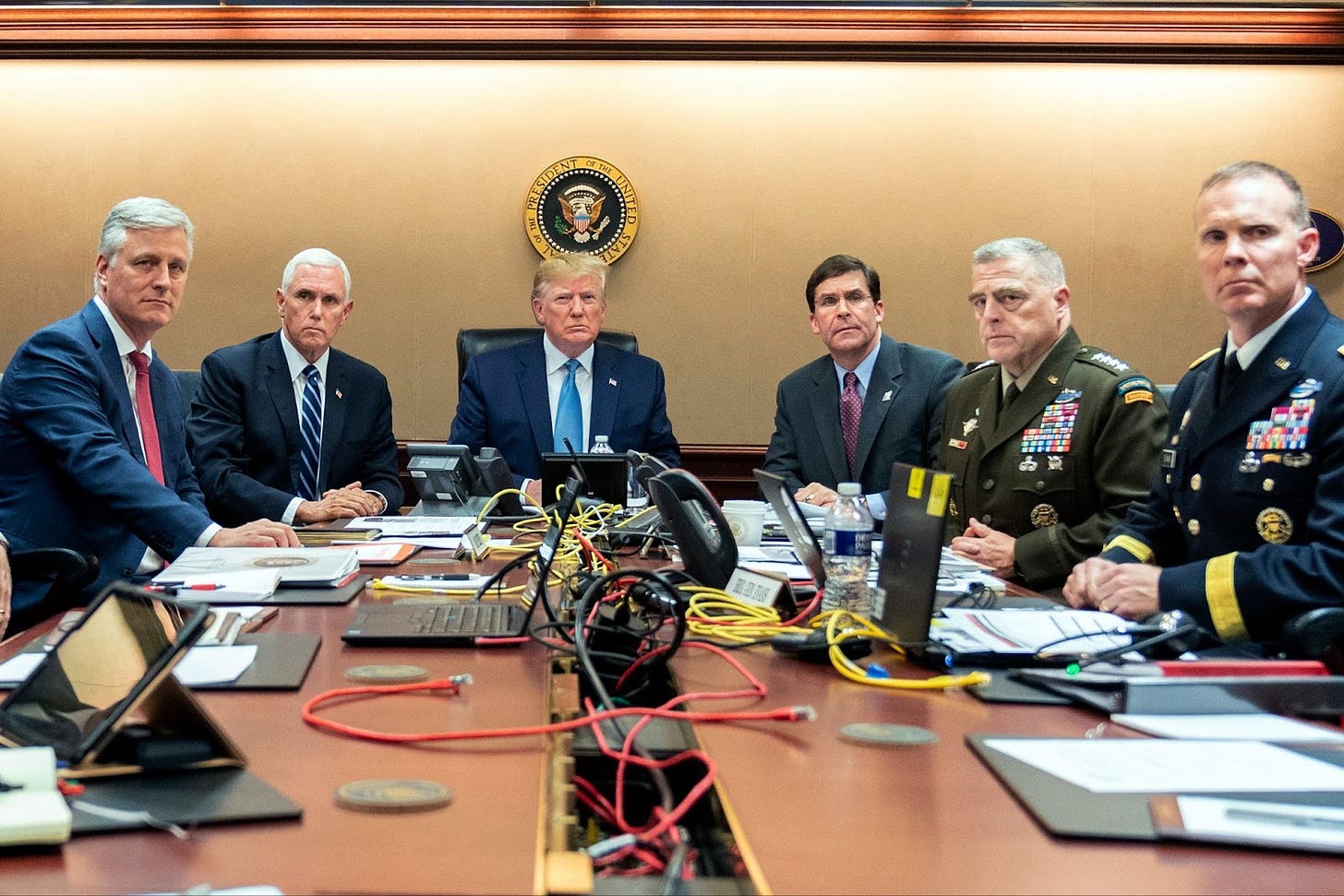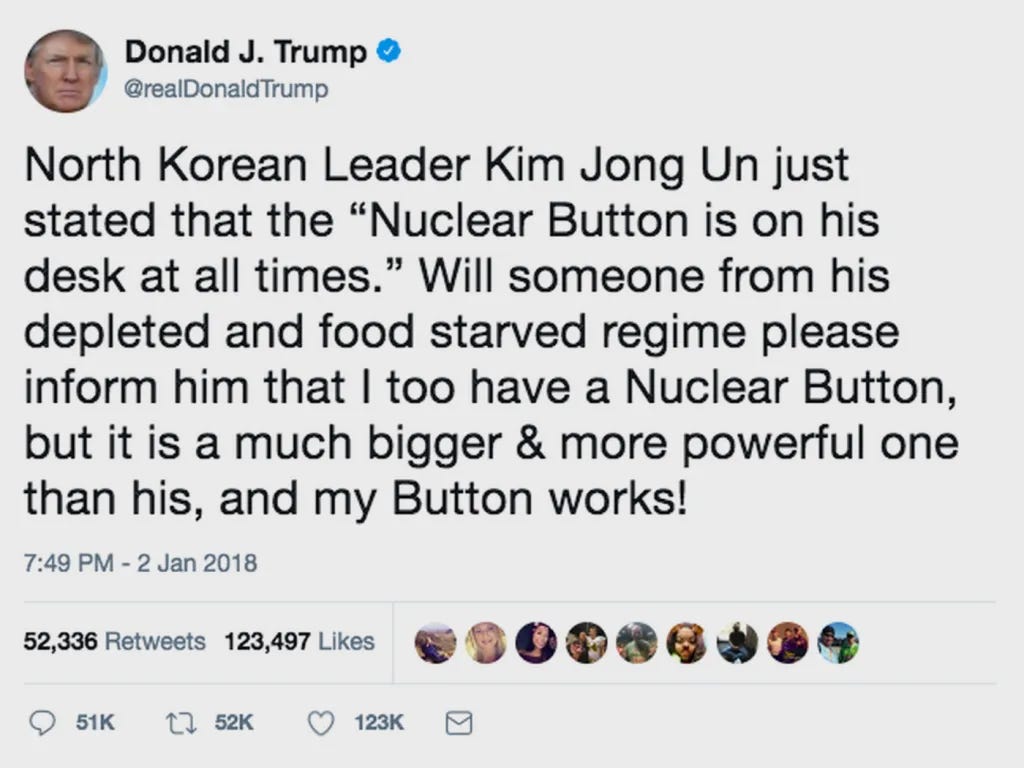by Joseph Mogul, anti-Zionist Jewish organizer and writer, author of “Here & Together.” For more of Joseph’s writing you can read his newsletter here.
*this piece was written before news of the ceasefire agreement broke

A few months ago I got a text from a high school friend, Bobby (not his real name), who I hadn’t spoken to in years. He sent me a graphic reading: “Donald Trump tells Israeli Prime Minister Netanyahu he wants the war in Gaza ended by the time he enters office.” Knowing my stance on Israel’s genocide in Gaza, he then tried to convince me that Trump was the anti-war candidate. Our text exchange read:
Him: “Trump is a peaceful president, that’s the main reason I like him more than Harris.”
Me: “They both love war.”
Him: “Trump hates war.”
Me: “I didn’t know you were so anti-war.”
Him: “Why would anyone be pro war. If you’re pro war there is something wrong with you… no offense to the pro war guys.”
I initially dismissed his stance as inconsequential, but as the election cycle ramped up, I realized this anti-war, pro-Trump position was becoming increasingly widespread. Then election day happened.
Before Trump takes office in a few days, it's worth diving deeper into how we got here. Political insiders have written about how Harris and the Democratic party abandoned the working class, arguing for the party to ‘do better next time.’ While the assessment of this abandonment is sound, the focus on changing the Democratic party is fraught–they have proven themselves obstinately pro-war. Instead, by analyzing the election’s rhetoric from an anti-war perspective, the movement can learn crucial lessons moving forward. Our ideas are popular enough to influence electoral strategies; however, because no political party genuinely represents anti-war politics, the resulting vacuum has allowed fascists to co-opt our rhetoric. Donald Trump’s election victory proves how dangerous this is.
Trump co-opting anti-war rhetoric
Trump’s messaging changed drastically over the course of a few months. On the debate stage in June 2024, Trump told Joe Biden he should let Israel “finish the job,” then called Biden a “very bad, weak Palestinian.” However, as election day inched closer, his rhetoric shifted. An October Times of Israel article reported: ‘Trump told Netanyahu he wants Gaza war over by time he enters office” (this is the article that Bobby sent me). He appeared in an Al Arabiya interview, saying: “I wanna see it all stop, I wanna see the Middle East get back to peace.” On October 30th, Trump tweeted: “During my Administration, we had peace in the Middle East, and we will have peace again very soon! I will fix the problems caused by Kamala Harris and Joe Biden and stop the suffering and destruction in Lebanon.” Even as Trump’s allies spewed Nazi rhetoric during the infamous Madison Square Garden rally, Trump doubled down on his supposed pro-peace stance, saying that under his leadership, “The Middle East will return to real peace, a lasting peace,” that he “will stop the chaos in the Middle East” and “stop the suffering and destruction in Lebanon.”
Trump’s war record
This co-opting of anti-war sentiment had an impact, at least enough to win people like Bobby’s vote. But Trump’s record as president proves this messaging is nothing but a cynical distortion.
The Abraham Accords, which Trump deemed “the deal of the century,” recognized Zionist sovereignty over Syrian territory in the Golan Heights and moved the U.S. embassy to Jerusalem, violating prior UN rulings. This so-called “peace deal” was the culmination of a four-year presidency which saw Trump deny Palestinian refugee rights, accelerate illegal settlements, and encroach on more Palestinian land.
Trump is in no way an ally of Palestinians, nor is he an advocate for peace. His track record includes escalating airstrikes in Afghanistan, which led to a 330% increase in civilian deaths. He supported the Saudi-led war against the Houthis in Yemen and backed multiple insurrection attempts. In Trump’s first two years in office, he launched 2,243 total drone strikes, a 16% increase from Obama, who was also known for his proclivity for drone strikes. In 2018, Trump brought the world to the brink of nuclear war with incendiary tweets about North Korea. According to former Pentagon official Van Jackson: “The world was closer … to nuclear war, at that time than any time, since the Cuban Missile Crisis. And it was totally avoidable.”
Congress reigned in Trump’s war hawking, passing a War Powers Resolution to end the intervention in Yemen and hold him back from inciting war with Iran. As my previous analysis piece discussed, Congress isn’t exactly overeager to hold America back from war. Trump’s fervor exceeded that of Congress, including representatives from both parties.
Since winning the 2024 election, Trump has reverted back to his old ways. During a recent Time “Person of the Year” interview, when asked about the possibility of war with Iran, he responded: “Anything can happen.” Trump doubled down on this reversal in a January 7th press conference when he said, “If they (hostages in Gaza) aren’t back by the time I get into office, all hell will break out in the Middle East, and it will not be good for Hamas or frankly for anyone.”
Does Trump truly care about Palestinian and Lebanese people? Of course not: his record speaks for itself. He is motivated only by power, and his anti-war rhetoric emerged from a calculated campaign strategy. An October New York Times article–published just before Trump made his shift towards anti-war rhetoric–reported that: “The Trump campaign’s research found that up-for-grabs voters were about six times as likely as other battleground-state voters to be motivated by their views of Israel’s war in Gaza.” These voters were “up for grabs” because of the Democratic party’s failures.
Democratic Party: the party of war
Harris and the Democratic party had an opportunity to change course after Biden dropped out of the election. They could have distanced themselves from Biden’s warmongering mania by taking a stance against unconditional military aid to Israel, the cycle of endless war profiteering, and it likely would have helped their electoral prospects.
Instead, during Harris’ DNC keynote speech, she said:
“As commander-in-chief, I will ensure America always has the strongest, most lethal fighting force in the world.”
In the same speech, she also stated that she would “always stand up for Israel's right to defend itself," a clear euphemism for Israel’s right to commit genocide. Harris campaigned with Liz Cheney, daughter of Dick Cheney, who has continued her father’s legacy of malevolence. Trump took advantage of this misstep by calling Liz Cheney a “radical war hawk” and saying, “She wanted to stay in Syria, I took them out; she wanted to stay in Iraq, I took them out.”
And then there was Harris’s running mate, Minnesota’s own Tim Walz, a proud supporter of Israel’s genocide. Walz has made statements such as: “Here in the state of Minnesota, we stand firmly with the state of Israel and the righteousness of the cause.” These words are backed up by actions, including his refusal to listen to divestment demands for Minnesota’s state pension and his ongoing invitation to weapons companies to operate in Minnesota. Walz backed out of a meeting with Palestinian Minnesotans after he learned they wanted to talk policy rather than posing for a photo shoot. Interestingly, in 2006 when Walz was vying for a House seat, he ran in opposition to the Iraq war and voted to withdraw soldiers. But in his role as governor, he has fallen back within party lines, which only increased during his time as Harris’s running mate.
If you’re a reader of this Substack, you are likely aware that the military-industrial complex transcends party lines. I was not surprised in the slightest by Harris’s words. However, it seems that voters in Minnesota and across America were taken aback by Harris‘s and Walz’s militaristic rhetoric.
In Minnesota, a place with a long history of anti-war resistance, 10% more prospective voters believed that the U.S. has provided too much military aid to Israel versus those who believed the U.S. has provided too little aid.
But the Democratic party ignored such warning signs and operated on a misguided belief that their “base” would vote for them no matter what because the alternative was a depraved, monstrous villain. They were wrong in that assumption.
A pre-election poll in battleground states about which candidate was better able to handle the “Israel-Hamas war” showed a 48%-33% gap in favor of Trump. The extent to which this gap influenced the election result is up for debate; however, it does lend itself to some conclusions for the anti-war movement.
Lessons to be learned for the anti-war movement

As Bobby wrote: “If you’re pro war there is something wrong with you.” The vast majority of people fashion themselves as anti-war. Nobody wants to identify with the people bombing and starving children. Trump’s team knew this, and they crafted an image of Trump as a dove of peace, providing a cognitive escape for people like Bobby to distance themselves from the culprits of these heinous acts.
While distressing, this strategy reflects the potential of the anti-war movement. What if instead of accepting the inevitability of politicians obscuring accountability by co-opting anti-war rhetoric, there was something else that people who find war morally unconscionable could aspire to? This is where we come in. When Trump inevitably incites and escalates conflict, we must both hold him to account and make an irresistible case for our movement as an alternative to fascism. Our calling is to build a tent with room for many. This tent must be so resilient, so deeply rooted, and so impervious to electoral currents, that the ruling class is forced to comply with our demands or face untenable backlash.
Another takeaway from Trump’s successful co-opting of anti-war rhetoric is that many people are easily deceived by an opposing fascist tent. U.S. elections enable this deception as candidates make bold proclamations during campaign season, only to promptly shirk them in favor of the imperial status quo. The harsh reality is that we can’t rely on elections for anti-war progress, and in this vacuum, our ideas can be easily co-opted by fascists. Rather than wondering how the incorrigible Democratic party might shift in response to their disastrous defeat, the more compelling questions are: Why are people being deceived, and what can we do to counter that?
Legacy media serves a heavy dose of deception. For example, when Amnesty International released their 296-page report finding Israel is committing genocide, the New York Times article on the report devoted most of its coverage to Israel’s denial of the genocide allegations. For more on the long, egregious history of media fraudulence, Mondoweiss has an extensive column analyzing media output that uncritically defends U.S. foreign policy and dehumanizes dissent.
There is an information battle to be won between our movement and the political/media operatives whose goal is endless war. The next four years will offer opportunities to expose hypocrisy and bring people in. How do we do so? Through sharp and accessible political education that gets to the roots of war–a concoction of racist ideologies and rabid hunger for land/resource plunder. Then we hone our collective energy towards aligned goals: divesting from companies complicit in genocide, ending the manufacturing of weapons in our communities, and slowly grinding down the gears of U.S. empire.
This publication, The Land of 10,000 Bombs, will continue providing an information base for Minnesota’s anti-war movement.1 As inauguration approaches, it is more clear than ever that building an anti-war front wherever we reside is absolutely necessary.
For more of Joseph’s writing on anti-war organizing, climate justice and Jewish arguments against Zionism, consider subscribing to his Substack.






